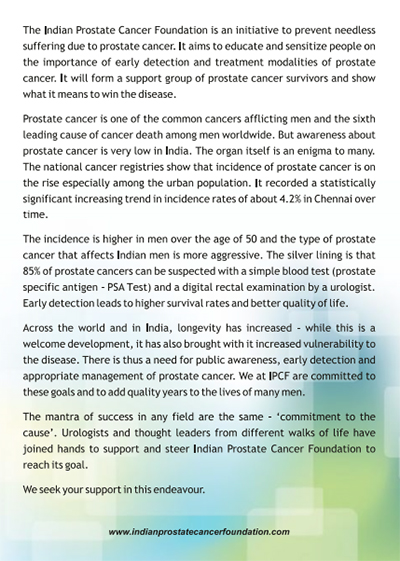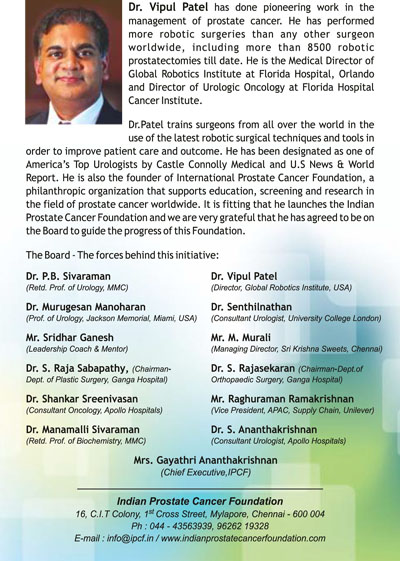The Indian Prostate Cancer Foundation (IPCF) is an organization committed to the cause of relieving the impact of prostate cancer in India through awareness and by supporting those afflicted by the condition. It is led by the magnitude of the cause and is steered by members of the medical fraternity, prostate cancer survivors, their families and the general public.
At IPCF we believe that knowledge is the key to surviving prostate cancer. We provide all the information you need to control and manage the condition – right from detection and diagnosis through recovery and rehabilitation aided by support groups.
Remember, prostate cancer is curable with early detection being the key.
The prostate is a walnut sized gland in men. It is closely linked with the urinary system and is a key part of the male reproductive system. It is located below the bladder and makes and stores seminal fluid, a milky fluid that nourishes sperm. As men grow older, the prostate gland frequently becomes a source of trouble. The three most common prostate problems are inflammation (prostatitis), prostate enlargement (BPH), and prostate cancer. Prostatitis and BPH are not necessarily signs or lead to cancer, but men suffering from it can also develop prostate cancer. All prostate related problems also do not necessarily mean incidence of prostate cancer.
The most common prostate problems are:
• An enlarged prostate – The prostate gets bigger as you get older. This is called an
enlarged prostate. It is common in men over 50. It is sometimes
called benign prostatic hyperplasia (BPH) or benign prostatic
enlargement (BPE). It is not cancer and there are ways to treat it.
• Prostatitis – Prostatitis is the name given to a set of symptoms which are thought to be caused by an infection or inflammation of the prostate. It is not cancer
• Prostate cancer - Normally the growth of all cells is carefully controlled in the body.
As cells die, they are replaced in an orderly fashion. Cancer can
develop when cells start to grow in an uncontrolled way. If this
happens in the prostate, you get prostate cancer.
Akand M, Celik O, Avci E, Duman I, Erdogru T. Open, laparoscopic and robot-assisted laparoscopic radical prostatectomy: comparative analysis of operative and pathologic outcomes for three techniques with a single surgeon's experience.Eur Rev Med Pharmacol Sci.
OBJECTIVE:
To compare outcomes of open (O-), laparoscopic (L-) and robot-assisted laparoscopic (RAL-) radical prostatectomy (RP) performed by the same surgeon.
Jain S, Saxena S, Kumar A. Epidemiology of prostate cancer in India. Meta Gene.
Data from national cancer registries shows that incidence of certain cancers are on rise in India. The cancers which are showing significant increase in incidence rates include prostate, mouth and kidney among male population, corpus uteri, breast and thyroid among female population and lung cancer in both male and female populations. In the present review article we have focused on epidemiology of prostate cancer in Indian subcontinent in terms of incidence, survival, and mortality etc.
Belbase NP1, Agrawal CS, Pokharel PK, Agrawal S, Lamsal M, Shakya VC.Prostate cancer screening in a healthy population cohort in eastern Nepal: an explanatory trial study.Asian Pac J Cancer Prev.
BACKGROUND:
Prostate cancer features a substantial incidence and mortality burden, similarly to breast cancer, and it ranks among the top ten specific causes of death in males.
Adhyam M, Gupta AK. A Review on the Clinical Utility of PSA in Cancer Prostate.Indian J SurgOncol.
ABSTRACT:
Prostate cancer has come to share the oncological centrestage among male cancers. The availability of Serum Prostate Specific Antigen, PSA, as a marker has encouraged it’s use to diagnose both cancer and cancer recurrence. Some clarity is required about its precise role in clinical practice.
Al B. Barqawi, Kevin J. Krughoff, and Khadijah Eid, “Current Challenges in Prostate Cancer Management and the Rationale behind Targeted Focal Therapy,” Advances in Urology, vol. 2012, Article ID 862639, 7 pages, 2012.
ABSTRACT:
Among men, prostate cancer has a high prevalence, with relatively lower cancer-specific mortality risk compared to lung and colon cancer. Prostate-specific antigen (PSA) screening has increased prostate cancer awareness since its implementation as a screening tool almost 25 years ago, but, due to the largely indolent course of this disease and the unspecific nature of the PSA test, increased incidence has largely been associated with cancers that would not go on to cause death (clinically insignificant), leading to an overdiagnosis challenge and an ensuing overtreatment consequences.
"HOW I BEAT
PROSTATE CANCER"
I was fortunate...Due to the fact that I caught it early it was confined in my prostate. I had the surgery. There's a debate about what you should do. One of the reasons that we're hearing about so many people having prostate cancer is because this test, this PSA test, detects this disease at a very early and curable stage.
- Prostate Cancer Survivor



